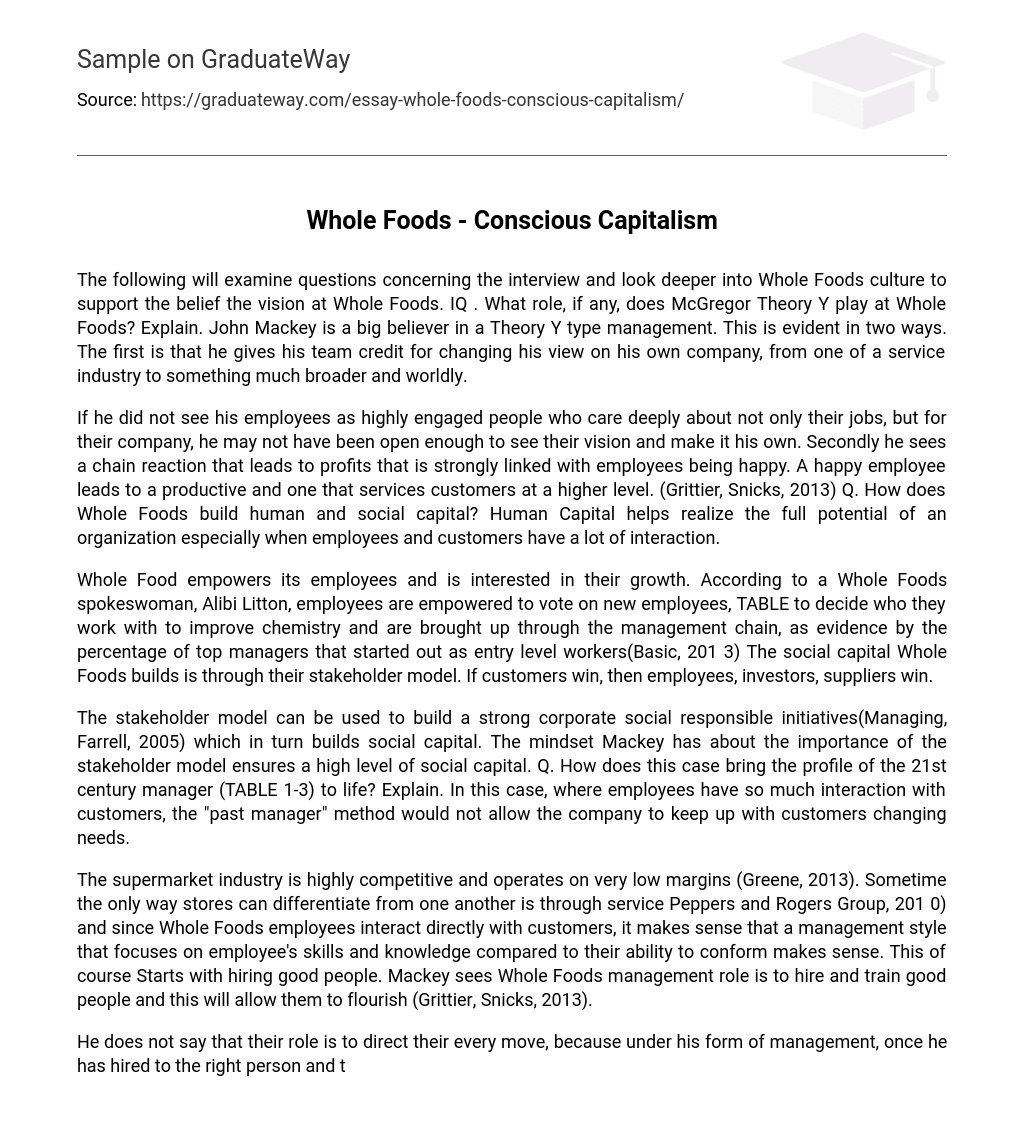The following will examine questions concerning the interview and look deeper into Whole Foods culture to support the belief the vision at Whole Foods. IQ . What role, if any, does McGregor Theory Y play at Whole Foods? Explain. John Mackey is a big believer in a Theory Y type management. This is evident in two ways. The first is that he gives his team credit for changing his view on his own company, from one of a service industry to something much broader and worldly.
If he did not see his employees as highly engaged people who care deeply about not only their jobs, but for their company, he may not have been open enough to see their vision and make it his own. Secondly he sees a chain reaction that leads to profits that is strongly linked with employees being happy. A happy employee leads to a productive and one that services customers at a higher level. (Grittier, Snicks, 2013) Q. How does Whole Foods build human and social capital? Human Capital helps realize the full potential of an organization especially when employees and customers have a lot of interaction.
Whole Food empowers its employees and is interested in their growth. According to a Whole Foods spokeswoman, Alibi Litton, employees are empowered to vote on new employees, TABLE to decide who they work with to improve chemistry and are brought up through the management chain, as evidence by the percentage of top managers that started out as entry level workers(Basic, 201 3) The social capital Whole Foods builds is through their stakeholder model. If customers win, then employees, investors, suppliers win.
The stakeholder model can be used to build a strong corporate social responsible initiatives(Managing, Farrell, 2005) which in turn builds social capital. The mindset Mackey has about the importance of the stakeholder model ensures a high level of social capital. Q. How does this case bring the profile of the 21st century manager (TABLE 1-3) to life? Explain. In this case, where employees have so much interaction with customers, the “past manager” method would not allow the company to keep up with customers changing needs.
The supermarket industry is highly competitive and operates on very low margins (Greene, 2013). Sometime the only way stores can differentiate from one another is through service Peppers and Rogers Group, 201 0) and since Whole Foods employees interact directly with customers, it makes sense that a management style that focuses on employee’s skills and knowledge compared to their ability to conform makes sense. This of course Starts with hiring good people. Mackey sees Whole Foods management role is to hire and train good people and this will allow them to flourish (Grittier, Snicks, 2013).
He does not say that their role is to direct their every move, because under his form of management, once he has hired to the right person and trained them properly, it would not be effective to manage them in a way an older style of manager might. Q. Where would you locate Whole Foods on Carol’s global corporate social responsibility pyramid in Figure 1-3? Explain. Believe Whole Foods follows the CARS Pyramid fairly well. A company’s sole responsibility has to be profit, or else they cannot continue to exist. I’m assuming they obey the law, as I have seen nothing to the contrary.
Their ethical and philanthropic efforts are strong as well. Their Whole Planet Foundation follows an ethical stakeholder model by supporting those who have helped them succeed and focuses on oral hunger. They have also joined the Marine Stewardship Council, a global nonprofit promoting sustainTABLE fishing practices to preserve fish stocks, as well as several other environmental initiatives. (Kennel) Q. Which Of the seven moral principles in TABLE 1-4 appear to be in force at Whole Foods? Explain. In my opinion there are several.
Whole Foods seems to treat their employees with respect. They have a strong benefit program. They certainly give employees a good deal of autonomy for this type of position by giving employees the ability to choose with whom they work (Basic). By allowing its employees the ability to see everyone’s salaries, it fosters a sense of honesty and fairness. With 90 percent of it managers and some executives starting out working in the store, this growth shows a loyalty towards employees and a commitment to improving their careers.
By investing in the Whole Planet Foundation and other philanthropic ventures, it shows a concern for the greater good. Q. What appeals to you (or does not appeal to you) about working at Whole Foods? Explain. What appeals to me about Whole Foods is wrapped up in the 7 moral principles talked about in question 5. I think it would be easy for Whole Foods, being in such a low margin, highly competitive market, to try and skimp on at least a few of these items, but most evidence point to the fact that they haven’t.





